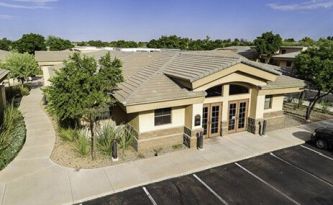PGS: New Breakthrough Technology Arizona Center for Fertility Studies Uses Breakthrough Technology to Significantly Improve IVF Outcomes
Published: 12/11/2015
Scottsdale/Phoenix, Arizona — Clinical researchers at Arizona Center for Fertility Studies have exciting news showing that, by screening all the chromosomes in an embryo, the number of successful pregnancies could be increased and the number of miscarriages decreased over traditional methods of in-vitro fertilization.
In many ways, human reproduction is an inherently difficult and inefficient process. Statistics show that any time a sperm meets an egg and fertilization occurs, pregnancy rates are only around 30%; 20% resulting in a clinical loss and another 50% lost between ovulation and a woman's period. Because many human eggs are "flawed," it can take many sperm, eggs, and even embryos to eventually produce one healthy baby. The average woman in this country takes 5.3 months to conceive.
Some of the techniques that help couples overcome infertility involve allowing reproductive medicine physicians (REI —reproductive endocrinologist/infertility specialists) to choose a woman's best reproductive tissues to use to have a child. In IVF, for example, not all the eggs will fertilize and not all the embryos will develop. Thus, the embryologist has to select which embryos they think will have the highest likelihood of establishing a successful pregnancy. Up to now, morphology (that is, how an embryo looked), has been the main criteria for choosing which embryos to transfer.
The ART-IVF team at Arizona Center for Fertility Studies has found a better way. Using recent breakthrough technology of 23-chromosome microarray, patients at ACFS have a 20+% higher pregnancy rate than those using conventional IVF (see PGS statistics below). Since chromosomal abnormalities (or aneuploidy) accounts for 70-80% of implantation failure (unsuccessful IVF attempt) and/or first-trimester pregnancy loss, the team at ACFS strongly recommends chromosome testing for all patients undergoing IVF.
Using 23-chromosome microarray technology, once each embryo reaches day 5 or the blastocyst stage (link to blastocyst section) (about 100+ cells), a biopsy is taken from the outer layer (trophectoderm) using a laser, and all 23 of its chromosomes are examined. Then, all the biopsied embryos are frozen. In a subsequently prepared cycle, 1-3 embryos (based on American Society of Reproductive Medicine guidelines for age) that are chromosomally normal are thawed and transferred into the woman after appropriate uterine preparation (FET — frozen embryo transfer).
By comparing a group of patients using 23-chromosome technology with a similar group using traditional methods (IVF without chromosome testing), the team at ACFS found that patients undergoing 23-chromosome microarray testing significantly increased their likelihood of successful pregnancy and reduced miscarriage rates, especially for patients of advanced maternal age in whom chromosome problems are more likely. Our most recent success rates using IVF with PGS can be found here.
Typically, the average cost of chromosome testing (PGS) is between $6-8000 depending on which clinic you are at. On top of the already high costs of IVF, this generally makes chromosome testing not affordable for most couples. Well, how do you get someone to do something?
You make it worth their while. At ACFS, we believe so strongly in chromosome testing that we offer PGT for $2900, which is less than the cost of an unsuccessful embryo transfer. This $2900 fee includes day 5 blastocyst biopsy (TE biopsy) and 23-chromosome microarray testing. Actually, by doing chromosome testing, ACFS loses money (see here for reasons why).
Human reproduction is inherently poor, as evidenced by the high miscarriage rates suspected to be as high as 70% (20% clinical loss and 50% loss between ovulation and menses) and the average time to achieve pregnancy of 5.3 months. As a women ages reproductively, her ability to make chromosomally-normal embryos decreases. As more and more couples are postponing childbirth, the average age of conception at ACFS is now in the mid to late thirties (average @37-38). As a result, we are seeing not only a decrease in egg production and/or quality but also an increase in chromosomally-abnormal embryos. These two factors result in decreased pregnancy rates, increase risk of a first-trimester miscarriage, and increase risk of having a child born with a chromosome abnormality (Down’s Syndrome).
At ACFS, we have found that the single most important reason for a failed IVF cycle (implantation failure) and/or first-trimester loss (miscarriage) is because the transferred embryos were chromosomally abnormal (aneuploid). This is based on the assumption that the ART laboratory operates at a high level of excellence.
ACFS was not able to say this 5-6 years ago, but if your embryos are not able to reach the blastocyst stage (day 5) in ACFS-ART laboratory culture system, then they would not have made it in you if they were transferred. The same is true of frozen embryos; if they do not survive the freeze/thaw process (vitrification) cryopreservation section at ACFS, then they would not have survived in a fresh transfer.
Some clinics disagree with these conclusions, but the overall experience at ACFS is quite the opposite. We have not routinely performed day 3-embryo transfer for the last 6+ years; and as shown from our data above, we feel very comfortable with our freeze/thaw (or vitrification), which is a very critical part of doing PGS-chromosome testing. Some clinics still will do a day 3 transfer because they are not comfortable with growing embryos to day 5 (advanced blastocyst culture), and tell their patients "it is better to transfer on day 3."
Also, ACFS believes it is more cost-effective to see if the embryos make it to day 5, and if they do not, ACFS feels that they would not have made it in you either, and at least would not have to pay for a transfer and "anxiously and hopefully" wait for the results of a pregnancy test (not to mention "those" progesterone shots and/or gel).
As a result of our data, ACFS strongly encourages our patients to do chromosome testing or PGS (preimplantation genetic screening) as part of their IVF. Although some reports in the literature to suggest that chromosome screening of embryos does not improve success rates, ACFS respectfully and strongly disagrees. Our data over the last two years shows quite the contrary: that IVF with chromosome testing significantly improves a couple's IVF success rates (20+% over conventional IVF if two embryos are transferred).
Reasons and Techniques for day 5-6 blastocyst biopsy (TE — trophectoderm biopsy) to test the chromosome makeup of each embryo. Better known as PGS or preimplantation genetic screening.











